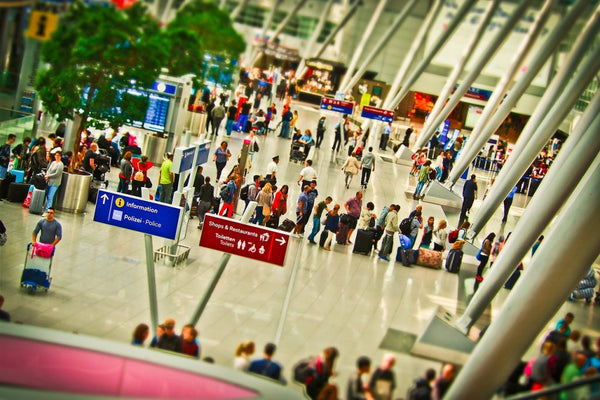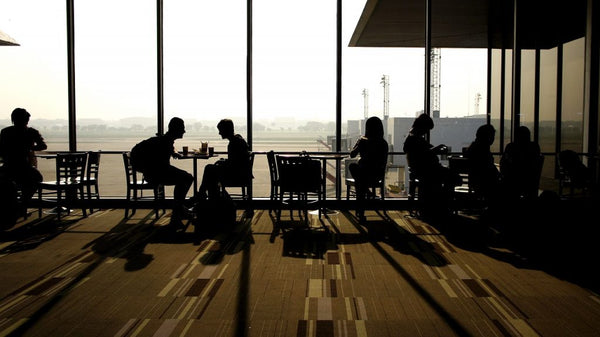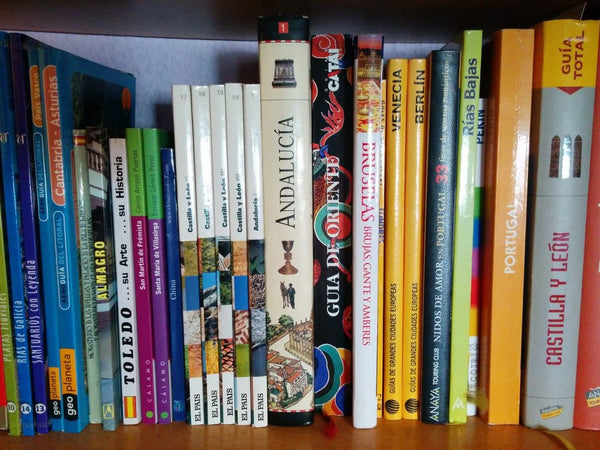5 Things that Stress Us Out When We Travel

Most of us experience excitement when planning a trip. We look forward to seeing and learning amazing new things, meeting interesting people, expanding our understanding of customs and languages different from our own, or merely relaxing and enjoying a change of pace and scenery from our regular routine at home.
In addition to the excitement, though, we also may experience a bit of apprehension, some doubts, some anxiety, a little travel stress. What if something goes wrong? Did I pack too much…not enough? What if I get sick? What if I lose (or have stolen) my valuables or passport? What if no one understands me?
With all these possibilities….should I even be going??
We have listed 5 situations that may cause you some travel anxiety…and ways to deal with each of them in order to alleviate stressful travel:
1. Travel Stress in Airports
Situation:
The queue to go through the Security checkpoint snakes through the airport like the line up outside an Apple store the night before the latest gadget is released! You’ve already wasted time – traffic to the airport was a ‘bear’…then, your luggage was overweight and you had to take the time to pay extra for that. Now, it’s a crapshoot on whether or not you’ll even get through Security and to your departure gate before the plane takes off without you!

When the airport counter queue is waaaaay to long!
Solution: In a word…PREPARE!
-
Use a digital luggage scale to weigh your baggage BEFORE you leave home. This will save you both time and money when you get to the airport. Home is the place to sort through your clothes to see what you can live without and what you must have on your trip. The airport floor is not that place

- Allow yourself extra time to get to the airport, to check-in, clear security and get to your departure gate. Cushion your time to deal with ‘what ifs’ that may arise. What if you have a flat tire en route to the airport? What if your taxi is late picking you up? What if the traffic is snarled? What if the check-in/Security line is l-o-o-n-n-g?
- It is recommended that you allow yourself at least 90 minutes for domestic flights and up to 3 hours for international flights. Factor in travel during busy holiday times (particularly Christmas, spring break, summer) – you know the airport is going to be especially busy then – plan accordingly.
- Apply for an ‘entrusted traveler’ program such as TSA’s PreCheck, Nexus, or Global Entry – each of which allows you expedited screening at participating airports.
You will start your trip with far less travel anxiety, if you give yourself plenty of time and arrive early to your departure gate, Now you can relax and amuse yourself while waiting for your flight to board. Explore the airport, do a little shopping, read, surf the web, grab a snack… or catch a few winks.

Get to relax before your flight by arriving at the airport early.
2. The Language Barrier
Situation:
Oftentimes, having people misunderstand you….or fail to comprehend you at all….can be a very humorous part of the international travel experience :-). On a chilly evening at an outdoor cafe in Cannes, France, I once asked the waiter to ‘light my shoes on fire’ when what I meant to ask was for him to ‘light the heater’ on the patio. On another occasion, in Mexico, I asked for ‘la nota’ thinking I was asking for the bill….the waiter brought me yet ‘another’ margarita. Oh, don’t worry…I drank it 
At other times, however, it can be downright scary trying to make yourself understood – particularly if you are in a less than ideal situation. The taxi driver seems to be taking you somewhere you don’t want to go…or, you’ve lost your passport….or any other scenario where you feel threatened or uncomfortable. How can you get your point across when you don’t speak the language?
Solution:
- Ask for a business card (or a written note) with the name and address of your hotel written in the local language. That way, you can show it to a taxi driver when you wish to return to your hotel or, if you are lost, show it to a local who should be able to point you in the right direction.
- Download a translation app on your phone before you leave home. Google Translate is one that can help you out in a plethora of languages. Simply point your camera at the written text (think menus, hours of operation, etc.) and ‘presto’…the app changes it to English right before your eyes! If you’re speaking directly with someone, they can speak into your phone and, once again, the Google Translate app will magically change the speech from the local language to English for you. How handy is that?? And, bonus…it’s a free app for both iPhone and Android users, and you can use it even if your phone isn’t connected to the internet.
- Pack a phrasebook for those times when you’re somewhere that your cell phone won’t work, or you forgot to charge your battery. Select from the English section the phrase that you wish to say, show it to a local and let them read the phrase in their own language. That person will then be able to respond by using the same process. Do try to learn some basic phrases for wherever you are traveling – ‘hello, please, thank you’, etc. will go a long way in most countries. People generally will appreciate your efforts.
- Seek out a hotel or a local travel agency. Many will have someone on staff who speaks at least limited English – particularly if they regularly have English-speaking guests or clients. Or, they may be able to direct you to someone else who can help you.

Try to learn basic phrases for the country you are going to travel in.
3. Getting Sick While Traveling
Situation:
Getting ill while you’re away from home is a definite cause of travel stress. Maybe you’ve eaten something that your stomach is really wishing you hadn’t and diarrhea has struck with a vengeance – damn you, Montezuma!!. Or, you fell asleep on the beach and your skin is crackling like a lamb on a barbeque spit at a Greek festival. Or, you feel like crap and fear you may have picked up some local bug or dread disease.
Solution:
- Stay hydrated…on the plane, when you’re out and about exploring, regardless of the temperature, but even more so if the weather is sweltering or you’re participating in strenuous activities. Ensure the water you drink is purified and safe for consumption. In many countries, such as Mexico, it is not recommended that you drink tap water or eat any raw foods that have been rinsed in tap water.
- Get plenty of rest – before you start your trip and throughout. Squeeze in an afternoon nap if you’re planning a late evening. As often as you can, get your 8 hours of sleep. Being rested will help you to fight off any bugs or colds going around.
- Keep your hands clean and use sanitizer. Airplanes and other forms of transportation are breeding grounds for germs and contagious diseases – especially colds and flu. Carry antibacterial wipes and don’t be afraid to use them – on the back of the seat ahead of you, on your tray table, on armrests, on the toilet seat in your hotel room. Wash your hands often with soap and warm water.
- Eat regularly and retain a semblance of healthy eating. That’s tough to do when you’re on vacation and may need to eat out for every meal. Use the 80-20 rule – choose healthy meals 80% of the time and indulge yourself the other 20% of your meals. Experiment with and enjoy the local foods, of course, but be aware that not all countries have strict laws for food storage and preparation as we have here.
- Check with your doctor regarding the vaccinations you require for certain countries and get them well in advance of your travel date. While many dreaded diseases have been all but eradicated in North America, the same does not hold true for other parts of the world.
- Check the government site to get informed on what illnesses/diseases may be prevalent or possible to contract in the country you will be visiting. To relieve some of your travel anxiety about necessary vaccines, disease alerts, and other health-related topics, check out this page as an excellent resource https://wwwnc.cdc.gov/travel.
- Ensure you have a sufficient supply of any prescription medications you require. Pack enough for the entire duration of your trip, plus a few extra… just in case.
- Purchase travel medical insurance.
4. Culture Shock

Make the decision to adjust your own point of view when you encounter new customs and norms.
Situation:
Each country comes with its own culture, set of ethics and values. What is totally acceptable in one country may be taboo in another. What we, as North Americans, may view as ‘rude’ or ‘aggressive’ behavior, is the norm in many countries. Alternatively, actions, gestures, or words that are acceptable to us, may be misunderstood or even deplorable to people from another country. For instance, throughout much of Asia, it is customary (and totally acceptable) to slurp your soup or noodles. The slurping sound ensures the cook that you are enjoying the food. In North America, slurping your soup is considered impolite and lacking in manners. Another example is a woman’s handbag placed on the floor near her is considered ‘bad Feng Shui’ in Asia but is perfectly acceptable in North America.
Solution:
- Do some research before you visit a country. Learn what is considered polite and what would come off as very rude. Pay attention to hand gestures which may be familiar and okay to us, but may have a very different connotation in another country.
- Read a guidebook containing detailed and valuable information about local manners and customs. These books are readily available in travel shops, libraries, or online.
- Hire a local guide, or at least confer with your hotel’s concierge if they have one. Having some assistance, especially when you first arrive in a strange country, may prove invaluable in keeping you from making an embarrassing faux pas.
- Don’t expect things to be the same as they are at home. Every nation has its own way of doing things – not better….not worse than we are accustomed to…just different.
You travel the world in order to expand your mind, to learn about other cultures, and to explore our beautiful home. It is impossible to have a learning experience if you travel to a foreign country and expect everything to be the same as it is at home. When you encounter new customs and norms, make the decision to adjust your own point of view and learn to go with the flow. Your travel stress will be reduced exponentially if you do!
5. Security Concerns
Situation:
Security today is a major cause of travel anxiety. Card readers can skim personal information from your credit cards and passport, even from a distance. Con artists and others who are out to take advantage of ‘rich’ tourists abound. Your luggage passes through many hands from the time you drop it off until you retrieve it from the baggage claim carousel. Along the way, someone may have sticky fingers and steal valuables you have packed.

Security: A major cause of travel anxiety today.
Solution:
- Protect your personal information by using an RFID-blocking wallet/passport/credit card holder, and your cash by storing it in a neck stash or money belt.
- Travel with a credit card that has a restricted credit limit. A thief can’t go on an extravagant shopping spree at your expense and to the detriment of your credit rating, should this card be stolen or lost.
- Don’t flash wads of cash or expensive jewelry! You may not view yourself as filthy rich, but in comparison with the majority of citizens of many of the countries you may visit, you are! The fact that you can travel to their country, stay in a hotel, possibly rent a vehicle is a good indication to them that you may be an easy mark to pickpocket, to a con, or worse, to rob.
- Lock your luggage with a TSA luggage lock and pick it up as soon as possible upon arrival. The TSA agents can open the lock if they wish to inspect the contents of your bag while making it more difficult for a would-be thief to open. Collecting your luggage from the carousel as soon as possible will make it less susceptible to being picked up by someone else…either by mistake or intentionally.
Written by Emma Ghattas
Need Help?
customercare@tarriss.com

